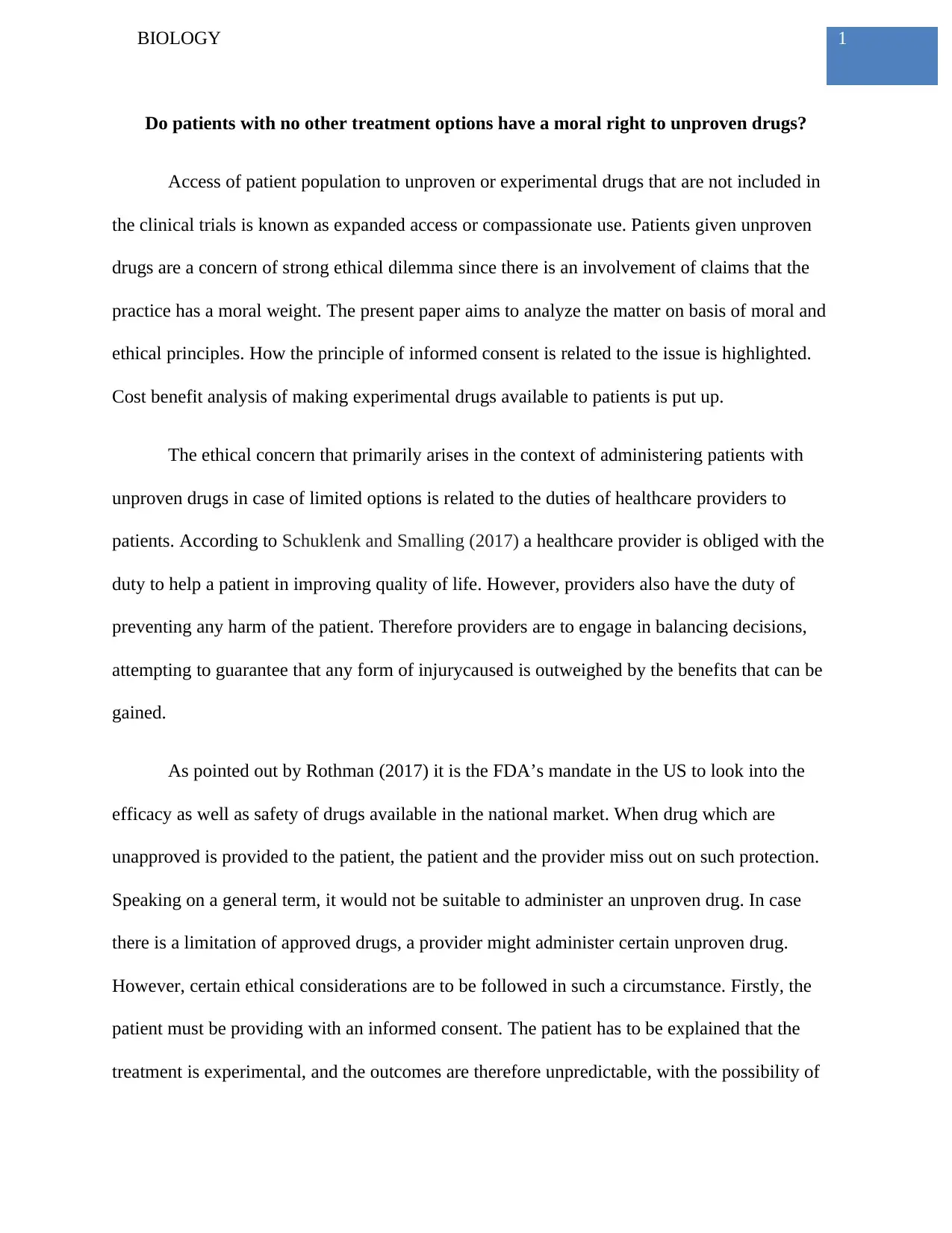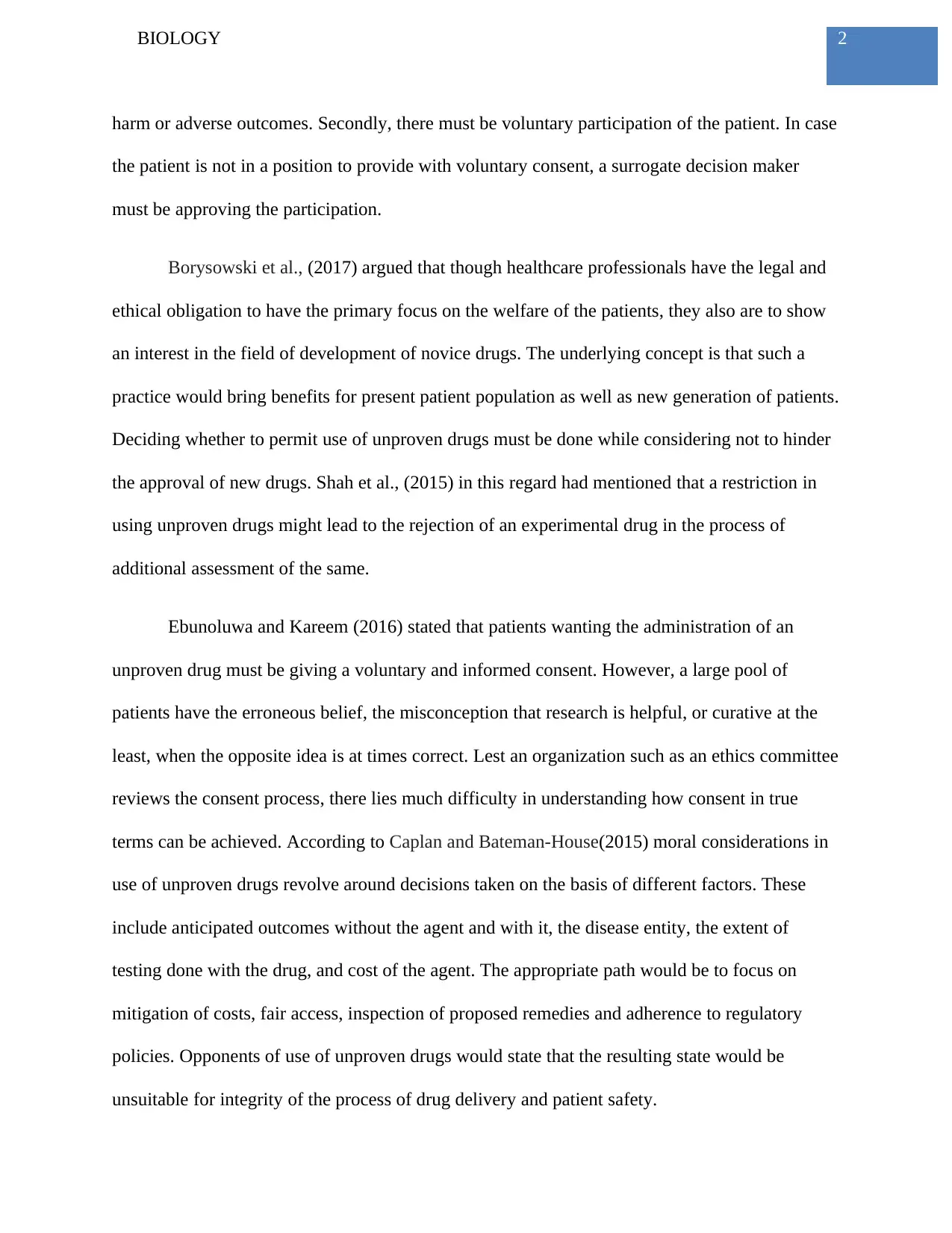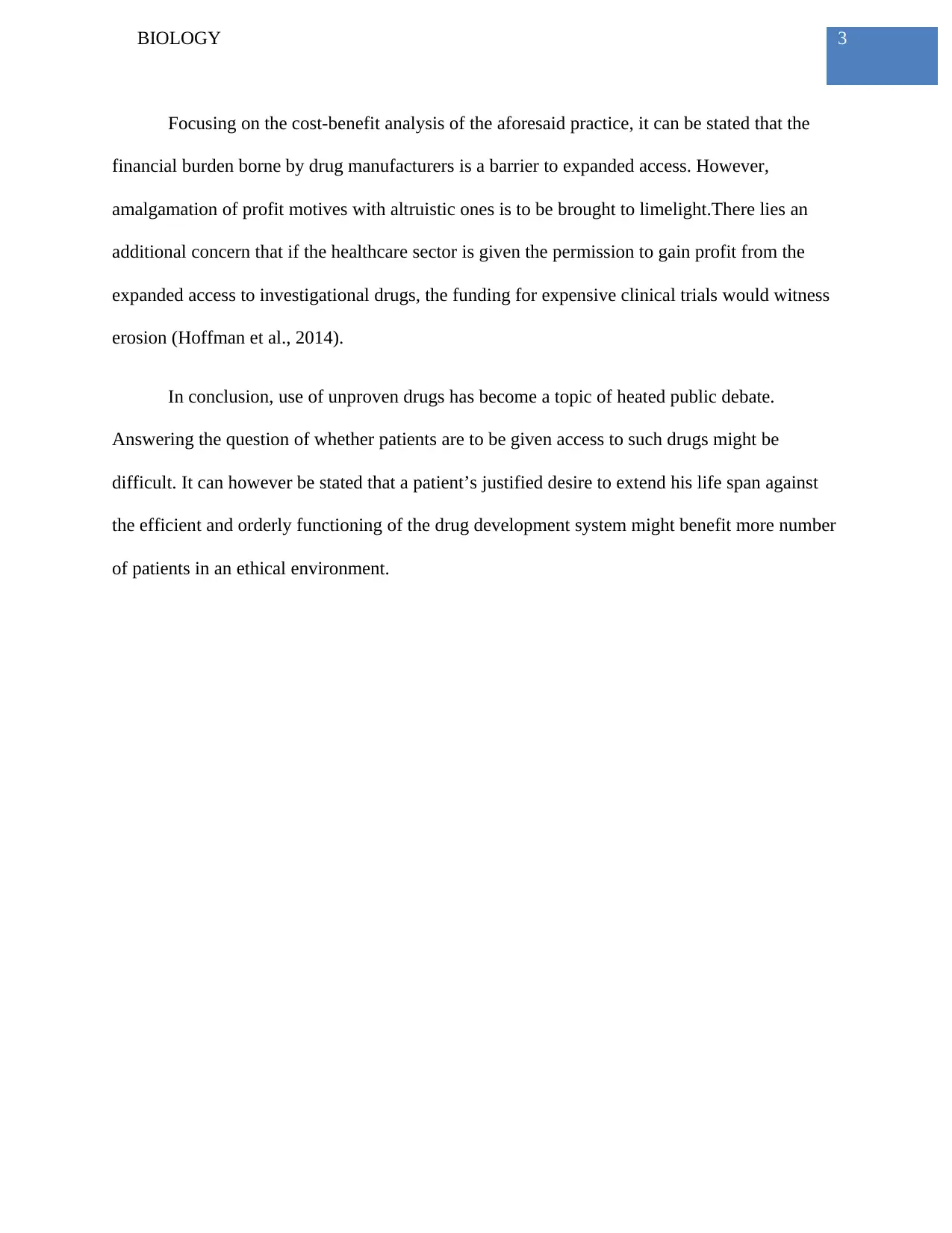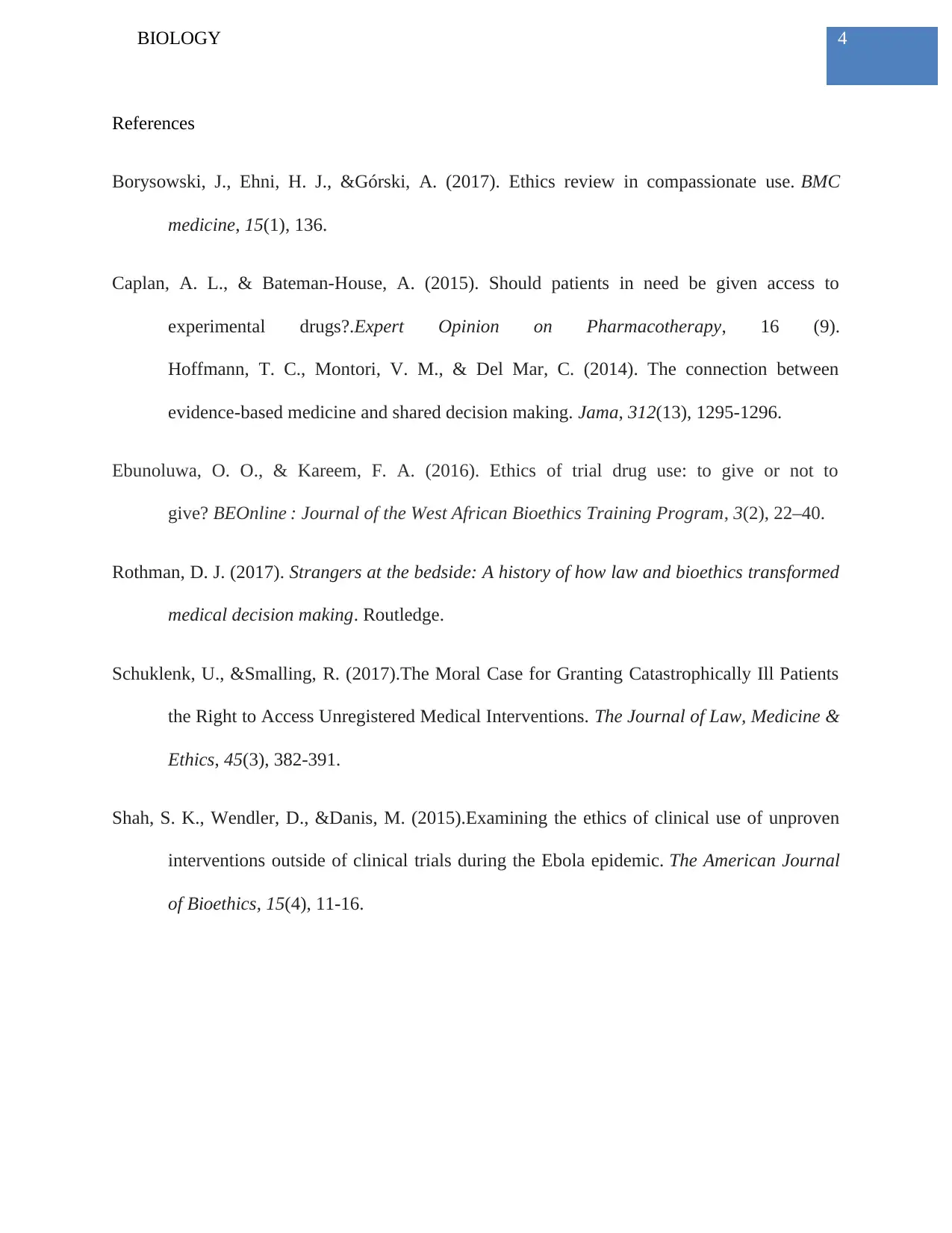Biology Essay: Ethical and Moral Considerations of Unproven Drugs
VerifiedAdded on 2021/06/17
|5
|1164
|6
Essay
AI Summary
This biology essay delves into the complex ethical and moral considerations surrounding patient access to unproven or experimental drugs, also known as expanded access or compassionate use. The paper examines the duties of healthcare providers, the importance of informed consent, and the potential benefits and risks of providing such drugs to patients with limited treatment options. It analyzes the cost-benefit analysis of making experimental drugs available, highlighting the role of the FDA in ensuring drug efficacy and safety. The essay emphasizes the need for voluntary participation and surrogate decision-making when patients are unable to provide consent. It also discusses the balance between patient welfare, drug development, and the potential for profit motives to influence access to experimental treatments. The conclusion underscores the ongoing public debate and the difficulties in answering whether patients should have access to unproven drugs while balancing the desire to extend life and the efficient functioning of the drug development system.

Running head:BIOLOGY
Biology
Name of student:
Name of university:
Author note:
Biology
Name of student:
Name of university:
Author note:
Paraphrase This Document
Need a fresh take? Get an instant paraphrase of this document with our AI Paraphraser

1BIOLOGY
Do patients with no other treatment options have a moral right to unproven drugs?
Access of patient population to unproven or experimental drugs that are not included in
the clinical trials is known as expanded access or compassionate use. Patients given unproven
drugs are a concern of strong ethical dilemma since there is an involvement of claims that the
practice has a moral weight. The present paper aims to analyze the matter on basis of moral and
ethical principles. How the principle of informed consent is related to the issue is highlighted.
Cost benefit analysis of making experimental drugs available to patients is put up.
The ethical concern that primarily arises in the context of administering patients with
unproven drugs in case of limited options is related to the duties of healthcare providers to
patients. According to Schuklenk and Smalling (2017) a healthcare provider is obliged with the
duty to help a patient in improving quality of life. However, providers also have the duty of
preventing any harm of the patient. Therefore providers are to engage in balancing decisions,
attempting to guarantee that any form of injurycaused is outweighed by the benefits that can be
gained.
As pointed out by Rothman (2017) it is the FDA’s mandate in the US to look into the
efficacy as well as safety of drugs available in the national market. When drug which are
unapproved is provided to the patient, the patient and the provider miss out on such protection.
Speaking on a general term, it would not be suitable to administer an unproven drug. In case
there is a limitation of approved drugs, a provider might administer certain unproven drug.
However, certain ethical considerations are to be followed in such a circumstance. Firstly, the
patient must be providing with an informed consent. The patient has to be explained that the
treatment is experimental, and the outcomes are therefore unpredictable, with the possibility of
Do patients with no other treatment options have a moral right to unproven drugs?
Access of patient population to unproven or experimental drugs that are not included in
the clinical trials is known as expanded access or compassionate use. Patients given unproven
drugs are a concern of strong ethical dilemma since there is an involvement of claims that the
practice has a moral weight. The present paper aims to analyze the matter on basis of moral and
ethical principles. How the principle of informed consent is related to the issue is highlighted.
Cost benefit analysis of making experimental drugs available to patients is put up.
The ethical concern that primarily arises in the context of administering patients with
unproven drugs in case of limited options is related to the duties of healthcare providers to
patients. According to Schuklenk and Smalling (2017) a healthcare provider is obliged with the
duty to help a patient in improving quality of life. However, providers also have the duty of
preventing any harm of the patient. Therefore providers are to engage in balancing decisions,
attempting to guarantee that any form of injurycaused is outweighed by the benefits that can be
gained.
As pointed out by Rothman (2017) it is the FDA’s mandate in the US to look into the
efficacy as well as safety of drugs available in the national market. When drug which are
unapproved is provided to the patient, the patient and the provider miss out on such protection.
Speaking on a general term, it would not be suitable to administer an unproven drug. In case
there is a limitation of approved drugs, a provider might administer certain unproven drug.
However, certain ethical considerations are to be followed in such a circumstance. Firstly, the
patient must be providing with an informed consent. The patient has to be explained that the
treatment is experimental, and the outcomes are therefore unpredictable, with the possibility of

2BIOLOGY
harm or adverse outcomes. Secondly, there must be voluntary participation of the patient. In case
the patient is not in a position to provide with voluntary consent, a surrogate decision maker
must be approving the participation.
Borysowski et al., (2017) argued that though healthcare professionals have the legal and
ethical obligation to have the primary focus on the welfare of the patients, they also are to show
an interest in the field of development of novice drugs. The underlying concept is that such a
practice would bring benefits for present patient population as well as new generation of patients.
Deciding whether to permit use of unproven drugs must be done while considering not to hinder
the approval of new drugs. Shah et al., (2015) in this regard had mentioned that a restriction in
using unproven drugs might lead to the rejection of an experimental drug in the process of
additional assessment of the same.
Ebunoluwa and Kareem (2016) stated that patients wanting the administration of an
unproven drug must be giving a voluntary and informed consent. However, a large pool of
patients have the erroneous belief, the misconception that research is helpful, or curative at the
least, when the opposite idea is at times correct. Lest an organization such as an ethics committee
reviews the consent process, there lies much difficulty in understanding how consent in true
terms can be achieved. According to Caplan and Bateman-House(2015) moral considerations in
use of unproven drugs revolve around decisions taken on the basis of different factors. These
include anticipated outcomes without the agent and with it, the disease entity, the extent of
testing done with the drug, and cost of the agent. The appropriate path would be to focus on
mitigation of costs, fair access, inspection of proposed remedies and adherence to regulatory
policies. Opponents of use of unproven drugs would state that the resulting state would be
unsuitable for integrity of the process of drug delivery and patient safety.
harm or adverse outcomes. Secondly, there must be voluntary participation of the patient. In case
the patient is not in a position to provide with voluntary consent, a surrogate decision maker
must be approving the participation.
Borysowski et al., (2017) argued that though healthcare professionals have the legal and
ethical obligation to have the primary focus on the welfare of the patients, they also are to show
an interest in the field of development of novice drugs. The underlying concept is that such a
practice would bring benefits for present patient population as well as new generation of patients.
Deciding whether to permit use of unproven drugs must be done while considering not to hinder
the approval of new drugs. Shah et al., (2015) in this regard had mentioned that a restriction in
using unproven drugs might lead to the rejection of an experimental drug in the process of
additional assessment of the same.
Ebunoluwa and Kareem (2016) stated that patients wanting the administration of an
unproven drug must be giving a voluntary and informed consent. However, a large pool of
patients have the erroneous belief, the misconception that research is helpful, or curative at the
least, when the opposite idea is at times correct. Lest an organization such as an ethics committee
reviews the consent process, there lies much difficulty in understanding how consent in true
terms can be achieved. According to Caplan and Bateman-House(2015) moral considerations in
use of unproven drugs revolve around decisions taken on the basis of different factors. These
include anticipated outcomes without the agent and with it, the disease entity, the extent of
testing done with the drug, and cost of the agent. The appropriate path would be to focus on
mitigation of costs, fair access, inspection of proposed remedies and adherence to regulatory
policies. Opponents of use of unproven drugs would state that the resulting state would be
unsuitable for integrity of the process of drug delivery and patient safety.
⊘ This is a preview!⊘
Do you want full access?
Subscribe today to unlock all pages.

Trusted by 1+ million students worldwide

3BIOLOGY
Focusing on the cost-benefit analysis of the aforesaid practice, it can be stated that the
financial burden borne by drug manufacturers is a barrier to expanded access. However,
amalgamation of profit motives with altruistic ones is to be brought to limelight.There lies an
additional concern that if the healthcare sector is given the permission to gain profit from the
expanded access to investigational drugs, the funding for expensive clinical trials would witness
erosion (Hoffman et al., 2014).
In conclusion, use of unproven drugs has become a topic of heated public debate.
Answering the question of whether patients are to be given access to such drugs might be
difficult. It can however be stated that a patient’s justified desire to extend his life span against
the efficient and orderly functioning of the drug development system might benefit more number
of patients in an ethical environment.
Focusing on the cost-benefit analysis of the aforesaid practice, it can be stated that the
financial burden borne by drug manufacturers is a barrier to expanded access. However,
amalgamation of profit motives with altruistic ones is to be brought to limelight.There lies an
additional concern that if the healthcare sector is given the permission to gain profit from the
expanded access to investigational drugs, the funding for expensive clinical trials would witness
erosion (Hoffman et al., 2014).
In conclusion, use of unproven drugs has become a topic of heated public debate.
Answering the question of whether patients are to be given access to such drugs might be
difficult. It can however be stated that a patient’s justified desire to extend his life span against
the efficient and orderly functioning of the drug development system might benefit more number
of patients in an ethical environment.
Paraphrase This Document
Need a fresh take? Get an instant paraphrase of this document with our AI Paraphraser

4BIOLOGY
References
Borysowski, J., Ehni, H. J., &Górski, A. (2017). Ethics review in compassionate use. BMC
medicine, 15(1), 136.
Caplan, A. L., & Bateman-House, A. (2015). Should patients in need be given access to
experimental drugs?.Expert Opinion on Pharmacotherapy, 16 (9).
Hoffmann, T. C., Montori, V. M., & Del Mar, C. (2014). The connection between
evidence-based medicine and shared decision making. Jama, 312(13), 1295-1296.
Ebunoluwa, O. O., & Kareem, F. A. (2016). Ethics of trial drug use: to give or not to
give? BEOnline : Journal of the West African Bioethics Training Program, 3(2), 22–40.
Rothman, D. J. (2017). Strangers at the bedside: A history of how law and bioethics transformed
medical decision making. Routledge.
Schuklenk, U., &Smalling, R. (2017).The Moral Case for Granting Catastrophically Ill Patients
the Right to Access Unregistered Medical Interventions. The Journal of Law, Medicine &
Ethics, 45(3), 382-391.
Shah, S. K., Wendler, D., &Danis, M. (2015).Examining the ethics of clinical use of unproven
interventions outside of clinical trials during the Ebola epidemic. The American Journal
of Bioethics, 15(4), 11-16.
References
Borysowski, J., Ehni, H. J., &Górski, A. (2017). Ethics review in compassionate use. BMC
medicine, 15(1), 136.
Caplan, A. L., & Bateman-House, A. (2015). Should patients in need be given access to
experimental drugs?.Expert Opinion on Pharmacotherapy, 16 (9).
Hoffmann, T. C., Montori, V. M., & Del Mar, C. (2014). The connection between
evidence-based medicine and shared decision making. Jama, 312(13), 1295-1296.
Ebunoluwa, O. O., & Kareem, F. A. (2016). Ethics of trial drug use: to give or not to
give? BEOnline : Journal of the West African Bioethics Training Program, 3(2), 22–40.
Rothman, D. J. (2017). Strangers at the bedside: A history of how law and bioethics transformed
medical decision making. Routledge.
Schuklenk, U., &Smalling, R. (2017).The Moral Case for Granting Catastrophically Ill Patients
the Right to Access Unregistered Medical Interventions. The Journal of Law, Medicine &
Ethics, 45(3), 382-391.
Shah, S. K., Wendler, D., &Danis, M. (2015).Examining the ethics of clinical use of unproven
interventions outside of clinical trials during the Ebola epidemic. The American Journal
of Bioethics, 15(4), 11-16.
1 out of 5
Related Documents
Your All-in-One AI-Powered Toolkit for Academic Success.
+13062052269
info@desklib.com
Available 24*7 on WhatsApp / Email
![[object Object]](/_next/static/media/star-bottom.7253800d.svg)
Unlock your academic potential
Copyright © 2020–2025 A2Z Services. All Rights Reserved. Developed and managed by ZUCOL.





